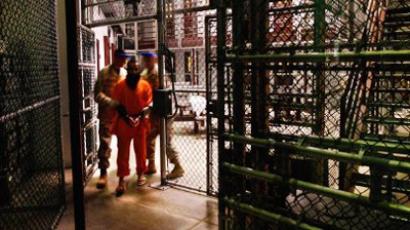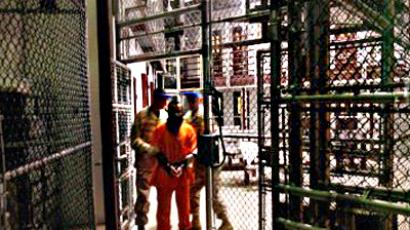Guantanamo upgrade: US to spend $40 mil on renovation
Despite promises to close Guantanamo Bay, Washington is now preparing to invest tens of millions into renovating the controversial facility's infrastructure.
The Pentagon is planning to install a $40-million fiber optic cable at Guantanamo, and the base's commanders say such a long term investment in infrastructure makes sense only if the US intends to continue operating the base."It only makes sense to do if we're going to be here for any period of time," Navy Capt. Kirk Hibbert told the Miami Herald. The goal of the project is to bring the infrastructure of the naval base up to par with other government agencies, said Army Lt. Col. Todd Breasseale, a spokesman for the Guantanamo military commissions. The base currently relies on a single satellite, which is prone to interference during bad weather, for its communications.An infrastructure project like this one may well suggest that the US military is preparing for long-term operations at Guantanamo. Breasseale, however, refuted these allegations, saying that the project is meant to serve the Guantanamo naval station and not the detention camp, which Washington still “has plans” to close.The project will require congressional approval and has been included into the fiscal 2013 budget, but the survey ship USNS Zeus is expected to arrive at the naval base in upcoming weeks.Cuban authorities have been notified about the project, but they apparently do not have any say on it. The US maintains that it is a lawful tenant of the base under a 1934 treaty that makes the lease permanent unless both governments agree to break it or if the US abandons the base property.The US' approach to the law in this situation should raise eyebrows, American lawyer Eric Montalvo told RT.“If you look at the lease or you look at the terms of how the negotiation occurred, Cuba has requested that the US leave on a number of occasions,” he said. “And if you look at the terms of the agreement, they do not conform to real estate law because there is this rule against perpetuities. You just can’t have something that goes on forever in a lease, there has to be a defined beginning and a defined end.” The US sends an annual rent check for $4,085 to Havana. But Cuban leader Fidel Castro said in 2007 that Cuba never cashed a single check except for one occasion in 1959 when it was done due to "confusion." Castro said that Cuba refused to cash the checks to protest the US occupation of the illegally usurped land, which he said was used for "dirty work."When President Obama was first running for office, he pledged in very strong terms to shut down Guantanamo. But not only did he not shut it down, the US is now renovating the facility.In 2009, Obama signed an executive order to close Guantanamo. But a decision on the specifics of such a plan was postponed, and in 2011, he issued an executive order permitting the indefinite detention of Guantanamo detainees.With indefinite detentions and documented use of torture, Guantanamo has put a black mark on America’s already spotty human rights record. Within the last decade of the War on Terror, about 800 people have passed through the camp. The majority of them had nothing to do with 9/11, according to the facility's former chief prosecutor.At the moment the prison houses 169 detainees, about half of whom were cleared for release but have few prospects of obtaining freedom due to a ban on transfers from Guantanamo. As for the rest of the captives, some of them have a shot at a military hearing, but most of them do not have even that chance because the government says they cannot be tried for one reason or another, while the US Supreme Court keeps refusing to take up Guantanamo detainees’ petitions.













